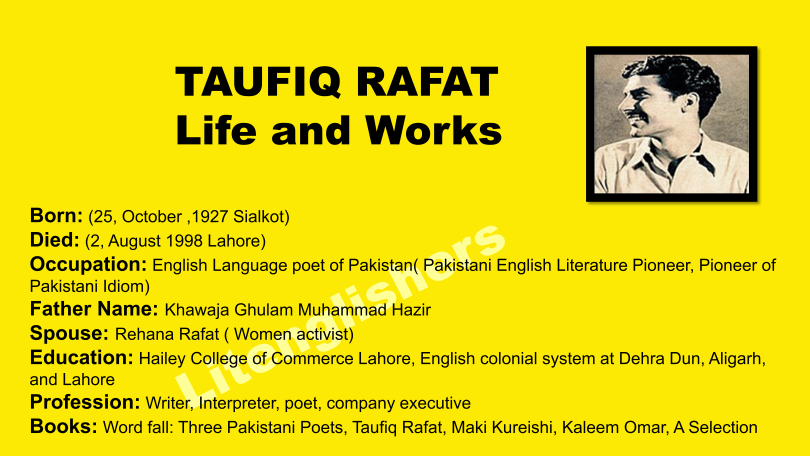Taufiq Rafat Biography
Born: (25, October ,1927 Sialkot)
Died: (2, August 1998 Lahore)
Occupation: English Language poet of Pakistan( Pakistani English Literature Pioneer, Pioneer of Pakistani Idiom)
Father Name: Khawaja Ghulam Muhammad Hazir
Spouse: Rehana Rafat ( Women activist)
Education: Hailey College of Commerce Lahore, English colonial system at Dehra Dun, Aligarh, and Lahore
Profession: Writer, Interpreter, poet, company executive
Books: Word fall: Three Pakistani Poets, Taufiq Rafat, Maki Kureishi, Kaleem Omar, A Selection
Biography:
Taufiq Rafat was considered the pioneer of Pakistani literature. He was a poet who did not work in broad strokes but very meticulously made subtle changes in tones and hues Taufiq Rafat was born in 1927 in Sialkot, where his family had its ancestral home. His father, Khwaja Ghulam Muhammed Hazir, was a trans-India supply erector for the British Indian army during the Second World War and after that, he moved to Dehra Dun with his family. At Partition in 1947 Sialkot became a part of Pakistan and the family returned to it.
Educational Career:
Taufiq Rafat was educated in the English colonial system at Dehra Dun, Aligarh, and Government College, Lahore. He graduated from the Hailey College of Commerce, Lahore, and became a company executive.
Political career:
Taufiq Rafat started writing poetry when he was 12 and his first collection ‘Arrival of the Monsoon’ was published in 1985 and other concerning poems written between 1947 and 1978. His second collection of poems was published in 2009 as ‘Half Moon’, by Taufiq Rafat Foundation, Known as one of the best English-language poets of the country, the late Taufiq Rafat’s aglow images and details of common sights and things still live on. He used the English language to express his thoughts and emotions just to make others understand what he wanted to convey to the world which is deeply rooted in the local context of Pakistan and the dynamic fabric of Pakistani culture.
He married into the same community of Kashmiris in Sialkot to which he belonged. His wife Rehana Rafat, was an asocial activist and worker.
Post- Independence or post-colonialism:
He started writing in the post-independent period of the early 19s. One of the primary concerns of writers in postcolonial societies has been to describe a “recovery” of the national, or cultural self-hood through highlighting various distinct aspects of their native identification e.g. via speech inflections and idiom, images of their land, geographical features, presentation of festivities, rites and rituals and so on, even every single thing have their distinct aspects.
Pakistani literature, since Independence, has come a long way from its early roots in post-independence English writings in the subcontinent because it is because of the colonizers and because the writers want to convey their departed emotions and feelings to conjoint the nation. Over some 50 years, it has emerged from its imitative, canned cast into its true and rather dynamic mode. Today, it has a distinctive ‘Pakistani’ color, festivities, cast, and flavors,all are different from that of other English literature being written in other former colonies where English was introduced initially by the colonizers but was soon adapted into “native” or “local” cultural ethos.
Reflection of Pakistani Literature:
Pakistani literature in English claims to have its idiom reflecting Pakistani culture, society, and mannerisms. It also has its system of symbols, reflecting its”Pakistanis”. Such a system, in terms of a local idiom, imagery, and symbolism, has emerged more visibly in Pakistani poetry than in fiction, and no other Pakistani poet has contributed more, to shaping a distinct Pakistani idiom, than Taufiq Rafat. He gave a soul to Pakistani literature.
According to Taufiq Rafat, poetry arises from the very land in which it is written. The cultural foundation that encourages its roots remains a viable source from which it gains nourishment and defines the Self of the poet. In Pakistan’s post-colonial spectrum, conformance, And Ahmed Larra the assimilation has generated poetry that presents the NATIVE poetic traditions that stiffened with the traditions found in English poetry and a redefined notion of identity. This modified literary habitat features innovative verbal expressions as well as a vibrant cultivation of innovative modes of expression.
Pakistani Poetry:
Pakistani poetry in English offers a variety of ideas and influences, both native and foreign to cosset and frolic with each other. These influences include the impact of the literary trends in Urdu; the pre and post-Independence, colonialism history, and the country’s contemporary politics that have shaped its present and are continuing to hew its future.
Variation between Rafat and British Poetry:
Notwithstanding Rafat’s poetry creates an atmosphere of romantic ideals that have an original Pakistani sensibility. He wanted to change the psyche of the people who thinks Pakistani poetry written in English was considered a weak version of the British style of writing as the themes and concepts borrowed from British poetry until his first work considered that promotes the British sensibility.
Taufiq Rafat point of view:
Actuality,in his poetry, established a set of romantic ideals that portrays that the Pakistani sensibility is quite different from the British sensibility,they are considered to be both sides of a pole. He describes different scenarios like seasonal moves and landscapes. British poetry urges people to go to nature to find solace but Rafat in his poetry uses Pakistani natural beauty to embellish how nature surrounded us and how man deal with it. Taufiq Rafat’s poetry describes the real struggle of people in war (The Medal, Sialkot, The village) on the other hand British people show material heroism in their poetry meanwhile he brought a different concept to Pakistani Poetry. He wanted to infuse a kind of patriotism in Pakistanis and show Britishers how their mentality is quite more logical than theirs.
